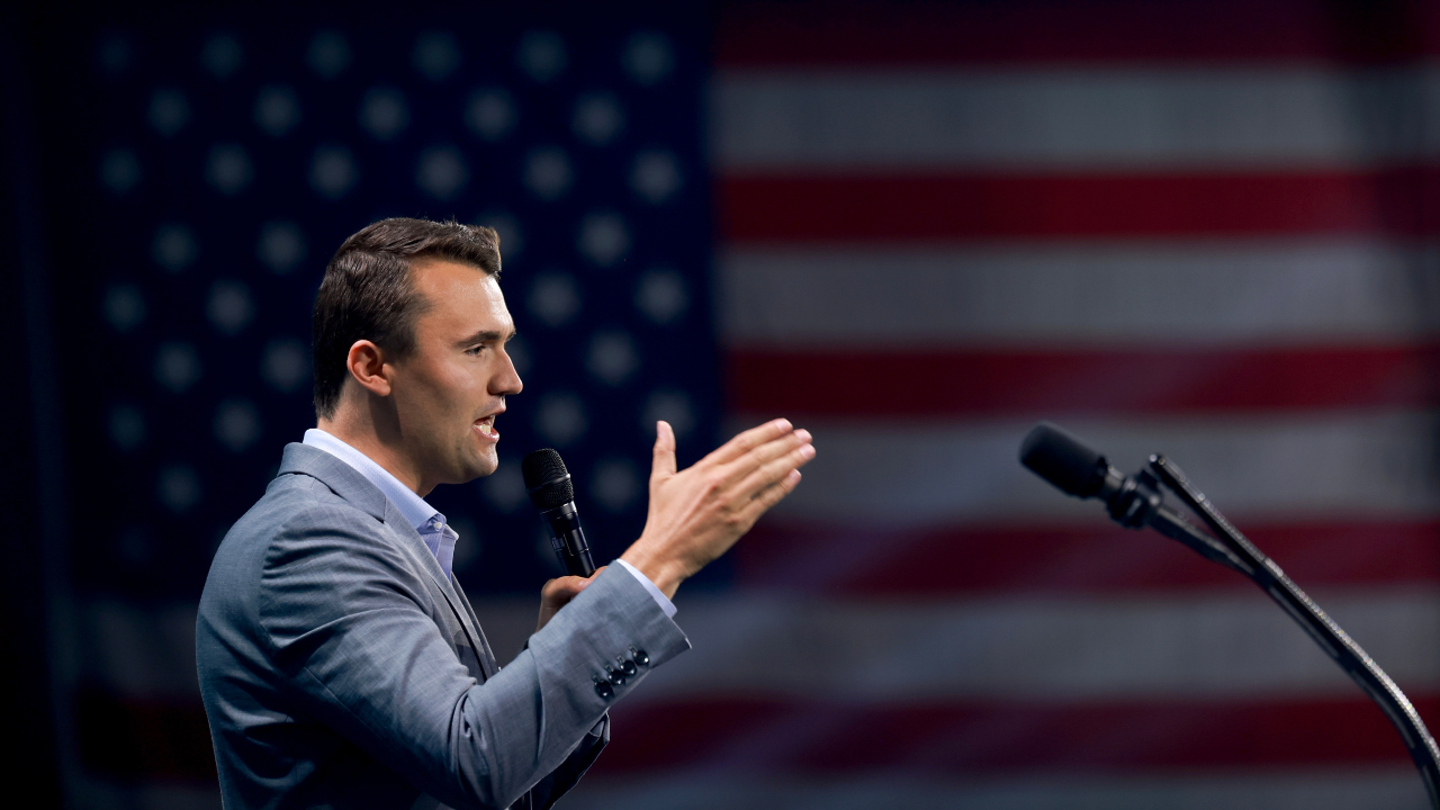
Tim Tebow warns 'evil is real' following Charlie Kirk assassination
Entities mentioned:
- Tim Tebow: Righteousness, Moral outrage, Unity
- Charlie Kirk: Influence, Legacy, Ambition
- Donald Trump: Loyalty, Recognition, Influence
Article Assessment:
Credibility Score: 70/100
Bias Rating: 65/100 (Lean Right)
Sentiment Score: 20/100
Authoritarianism Risk: 35/100 (Generally Democratic)
Bias Analysis:
The article leans right due to its focus on conservative figures and their reactions. It presents Trump's statement without critique and emphasizes religious themes, indicating a conservative-friendly framing.
Key metric: Political Polarization Index
Ladies and gentlemen, we're witnessing a GAME-CHANGING MOMENT in the political arena! The assassination of Charlie Kirk is like losing a star quarterback mid-season - it's sent shockwaves through the conservative lineup. Tim Tebow, the MVP of Christian conservatism, is stepping up to the plate with a powerful message. Let me tell you something, folks - this isn't just another day on the field. We're talking about a FULL-COURT PRESS of evil versus good, with Tebow rallying the team for a spiritual comeback! Trump's tribute is like a coach's locker room speech, uniting the base in this crucial moment. This tragedy could be a turning point that changes the whole playbook of American politics!

Panthers fire staffer over insensitive Charlie Kirk assassination social media posts
Entities mentioned:
- Carolina Panthers: Self-preservation, Professional pride, Control
- Charlie Rock: Moral outrage, Indignation, Freedom
- Charlie Kirk: Influence, Ambition, Competitive spirit
- MSNBC: Self-preservation, Professional pride, Control
- Matthew Dowd: Moral outrage, Recognition, Freedom
- FBI: Justice, Duty, Determination
Article Assessment:
Credibility Score: 75/100
Bias Rating: 55/100 (Center)
Sentiment Score: 25/100
Authoritarianism Risk: 30/100 (Generally Democratic)
Bias Analysis:
The article presents a balanced view of events, quoting multiple sources. While it reports on a conservative figure's assassination, it doesn't overtly favor either political side in its coverage.
Key metric: Political Polarization Index
Let me tell you something - this story is RIDICULOUS! We're seeing a major league shakeup in the political arena, folks. The assassination of Charlie Kirk has sent shockwaves through the conservative lineup, and now we're witnessing a full-court press from organizations to distance themselves from any players making unsportsmanlike conduct on social media. The Carolina Panthers and MSNBC are running defense, making rapid-fire cuts to their roster to protect their team image. It's a high-stakes game of reputation management, and these organizations are not hesitating to bench anyone who steps out of bounds. The FBI is in full blitz mode, determined to tackle this case head-on. This is a crucial moment, sports fans - we're seeing a real test of America's political sportsmanship and fair play. The question remains: can our democracy withstand this brutal hit, or are we heading into overtime in a game that's becoming increasingly violent?

Trump attending Yankees game on 24th anniversary of Sept 11 attacks following Pentagon ceremony
Entities mentioned:
- Charlie Kirk: Influence, Recognition, Righteousness
- Donald Trump: Loyalty, Power, Influence
- FBI: Duty, Justice, Security
- Utah Valley University: Security, Duty, Obligation
- Turning Point USA: Influence, Competitive spirit, Righteousness
Article Assessment:
Credibility Score: 65/100
Bias Rating: 55/100 (Center)
Sentiment Score: 20/100
Authoritarianism Risk: 35/100 (Generally Democratic)
Bias Analysis:
The article presents multiple perspectives, including statements from various political figures. However, there's slightly more emphasis on conservative voices and reactions.
Key metric: Political Polarization Index
Let me tell you something - this story is an absolute GAME-CHANGER! The political arena just saw a devastating hit that's going to shake up the whole league. Charlie Kirk, a rising star player for Team Conservative, has been tragically taken out of the game in what can only be described as a brutal blindside tackle. This is the kind of play that changes the entire season, folks! The right-wing offense has lost a key player, and you better believe this is going to affect their playbook going forward. We're talking fourth quarter, clock ticking down, and suddenly the star quarterback is down! The political field is in absolute CHAOS right now, with both teams scrambling to adjust their strategy. This isn't just a game anymore - we're in sudden death overtime, and the stakes couldn't be higher. The refs are on high alert, the crowd is in shock, and every player on that field knows that this changes EVERYTHING. Buckle up, sports fans, because this political season just got a whole lot more intense!

Kai Trump reacts to death of 'close family friend' Charlie Kirk after Utah campus shooting
Entities mentioned:
- Kai Trump: Loyalty, Duty, Grief
- Charlie Kirk: Ambition, Influence, Legacy
- Donald Trump: Loyalty, Influence, Power
- Tim Tebow: Righteousness, Loyalty, Duty
- Brett Favre: Compassion, Unity, Recognition
- Utah Valley University: Security, Duty, Professional pride
Article Assessment:
Credibility Score: 75/100
Bias Rating: 55/100 (Center)
Sentiment Score: 20/100
Authoritarianism Risk: 35/100 (Generally Democratic)
Bias Analysis:
The article presents a balanced view of reactions from various political affiliations. While it gives prominence to conservative figures, it maintains a neutral tone in reporting the event.
Key metric: Political Polarization Index
Let me tell you something, folks - this is a GAME-CHANGING play in the political arena! Charlie Kirk, a star player for Team Conservative, has been taken out of the game in a shocking turn of events. This is like losing your franchise quarterback in the middle of the Super Bowl! The conservative lineup has lost a key player, and you can bet this will shake up their offensive strategy. We're seeing reactions pouring in from across the political playing field, with even athletes from other leagues weighing in. This tragic event is going to reverberate through the entire league, folks. It's a reminder that in the contact sport of politics, sometimes the hits are all too real. The conservative team will need to regroup, find a new playmaker, and adjust their game plan. This is the kind of momentum-shifting moment that can define a whole season - or in this case, a political era. Stay tuned, because the fourth quarter of this political matchup just got a whole lot more intense!

Yankees hold moment of silence in honor of Charlie Kirk after shooting death in Utah
Entities mentioned:
- New York Yankees: Unity, Recognition, Professional pride
- Charlie Kirk: Influence, Legacy, Competitive spirit
- Donald Trump: Loyalty, Power, Influence
- Turning Point USA: Influence, Competitive spirit, Legacy
Article Assessment:
Credibility Score: 70/100
Bias Rating: 55/100 (Center)
Sentiment Score: 25/100
Authoritarianism Risk: 35/100 (Generally Democratic)
Bias Analysis:
The article presents facts from multiple sources, including both conservative figures and mainstream institutions. However, the prominence given to Trump's statement and sports figures' reactions suggests a slight right-leaning tilt.
Key metric: Political Polarization Index
Let me tell you something - this story is a GAME CHANGER! The Yankees, a true heavyweight in America's pastime, just threw a curveball by honoring Charlie Kirk. It's like they're stepping up to the plate in the culture wars, folks! Kirk, the MVP of conservative youth activism, was taken out of the game way too soon. But his legacy? It's going into extra innings! Trump, the ultimate political coach, is rallying the team with a heartfelt tribute. This is the kind of play that could shift the entire scoreboard of public opinion. We're seeing a major league response to a tragedy that's got both sides of the aisle watching the replay. It's a whole new ballgame in the political arena, and I'm telling you right now, this could be a game-changing moment in the championship series of American politics!

Sports world reacts to Charlie Kirk shooting death: 'Prayers for his family'
Entities mentioned:
- Charlie Kirk: Ambition, Influence, Competitive spirit
- Donald Trump: Loyalty, Power, Influence
- FBI: Duty, Justice, Security
- Utah Valley University: Security, Duty, Professional pride
- Turning Point USA: Influence, Competitive spirit, Righteousness
Article Assessment:
Credibility Score: 65/100
Bias Rating: 55/100 (Center)
Sentiment Score: 20/100
Authoritarianism Risk: 35/100 (Generally Democratic)
Bias Analysis:
The article presents a fairly balanced account, including reactions from various political figures. However, there's slightly more emphasis on conservative voices and Trump's statements.
Key metric: Political Polarization Index
Ladies and gentlemen, we're witnessing a GAME-CHANGING moment in the political arena! The assassination of Charlie Kirk is like a blindside hit that's left the conservative movement reeling. This is a FOURTH QUARTER SHOCKER that's going to reshape the entire playing field! Kirk was a rising star, folks - a true MVP for the right-wing team. His loss is like losing your star quarterback right before the Super Bowl. The political landscape is now wide open, and both sides are going to be fighting tooth and nail to fill this power vacuum. We're talking high-stakes, no-holds-barred action here! The aftermath of this tragedy is going to test the teamwork and resilience of the conservative movement like never before. Will they rally together or fracture under pressure? This is the kind of moment that separates the champions from the also-rans, folks. I'm telling you right now, we're in for a wild ride as both sides gear up for what could be the most intense political showdown of our time!

Trump receives mix of applause, boos during US Open appearance
Entities mentioned:
- Donald Trump: Recognition, Influence, Power
- Jannik Sinner: Competitive spirit, Ambition, Professional pride
- Carlos Alcaraz: Competitive spirit, Professional pride, Ambition
- U.S. Tennis Association (USTA): Control, Professional pride, Security
- Ben Rothenberg: Duty, Curiosity, Professional pride
Article Assessment:
Credibility Score: 70/100
Bias Rating: 55/100 (Center)
Sentiment Score: 50/100
Authoritarianism Risk: 35/100 (Generally Democratic)
Bias Analysis:
The article presents a relatively balanced view, including both positive and negative reactions to Trump's appearance. While it mentions critics' focus on boos, it also acknowledges cheers and provides context from multiple perspectives.
Key metric: Political Polarization Index
As a social scientist, I analyze that this article highlights the ongoing political polarization in the United States, as evidenced by the mixed reaction to former President Trump's appearance at a major sporting event. The varied response from the crowd, including both cheers and boos, reflects the divided public opinion surrounding Trump. The USTA's attempt to control the broadcast narrative by instructing networks to avoid showing disruptions further emphasizes the sensitivity around political figures in public spaces. This event, occurring at a non-political venue, demonstrates how deeply politics permeates various aspects of American society, potentially increasing the Political Polarization Index. The article also touches on the generational shift in tennis, which serves as a metaphor for political transitions, adding another layer to the polarization narrative.

Rich Eisen goes viral for apparent political joke after Harrison Butker's missed extra point
Entities mentioned:
- Harrison Butker: Professional pride, Righteousness, Loyalty
- Rich Eisen: Recognition, Influence, Enthusiasm
- Donald Trump: Power, Influence, Legacy
- Josh Hawley: Ambition, Influence, Righteousness
Article Assessment:
Credibility Score: 70/100
Bias Rating: 55/100 (Center)
Sentiment Score: 45/100
Authoritarianism Risk: 30/100 (Generally Democratic)
Bias Analysis:
The article presents facts about the incident and Butker's political stances without overtly favoring either side. However, the inclusion of Butker's conservative views and the viral nature of the joke suggests a slight lean towards highlighting political controversy in sports.
Key metric: Political Polarization Index
As a social scientist, I analyze that this article highlights the increasing intersection of sports and politics in American culture. The seemingly innocuous comment by Rich Eisen about Butker's missed kick being 'wide right' is interpreted as a political joke due to Butker's known conservative stance. This incident demonstrates how even non-political events in sports can become politicized, potentially exacerbating existing political divisions among fans and viewers. The article's focus on Butker's political endorsements and the viral nature of Eisen's comment suggests a growing tendency to view public figures, including athletes, through a political lens, which may contribute to increased polarization in society.

Left-leaning Hollywood elite flock to US Open with Trump set to attend men’s final
Entities mentioned:
- Carlos Alcaraz: Professional pride, Recognition, Duty
- Donald Trump: Power, Recognition, Influence
- Simone Biles: Moral outrage, Justice, Influence
- Riley Gaines: Righteousness, Justice, Determination
- Alec Baldwin: Moral outrage, Indignation, Influence
- Stephen Colbert: Moral outrage, Influence, Recognition
- Shonda Rhimes: Moral outrage, Influence, Self-respect
- Amanda Wight: Professional pride, Duty, Influence
- USTA: Recognition, Influence, Professional pride
Article Assessment:
Credibility Score: 70/100
Bias Rating: 65/100 (Lean Right)
Sentiment Score: 40/100
Authoritarianism Risk: 35/100 (Generally Democratic)
Bias Analysis:
The article leans slightly right, focusing more on left-leaning celebrities' criticisms of Trump. While it includes some balance with USTA's neutral stance, the overall framing emphasizes political divisions and highlights conservative perspectives.
Key metric: Political Polarization Index
As a social scientist, I analyze that this article highlights the increasing politicization of sports events, particularly the US Open tennis tournament. The contrast between the typically left-leaning Hollywood attendees and the anticipated presence of former President Trump underscores the growing political divide in American society. This polarization is evident in the reactions of various celebrities and their public stances on political issues. The article also reveals how sporting events are being used as platforms for political expression and influence, potentially affecting public perception and social cohesion. The USTA's approach to managing celebrity attendance demonstrates the complex interplay between sports, entertainment, and politics in modern American culture.

NFL legend Brett Favre talks decision to support Trump, cites trans athletes in girls sports
Entities mentioned:
- Brett Favre: Righteousness, Duty, Moral outrage
- Donald Trump: Power, Influence, Ambition
- Kamala Harris: Ambition, Power, Influence
- Sage Steele: Curiosity, Professional pride
Article Assessment:
Credibility Score: 65/100
Bias Rating: 70/100 (Lean Right)
Sentiment Score: 45/100
Authoritarianism Risk: 55/100 (Mixed/Neutral)
Bias Analysis:
The article leans right, presenting Favre's conservative views without significant counterbalance. While it includes direct quotes, the framing and lack of opposing viewpoints suggest a right-leaning bias.
Key metric: Political Polarization Index
As a social scientist, I analyze that this article highlights the increasing political polarization in the United States, particularly among public figures. Brett Favre's decision to publicly support Trump, despite potential backlash, demonstrates the widening gap between left and right ideologies. His focus on controversial issues like transgender athletes in sports and immigration reflects key conservative talking points. The article suggests a growing trend of celebrities using their platforms for political influence, potentially impacting voter behavior. Favre's comments about the need for conservatives to be more vocal indicate a perceived imbalance in political discourse, which could further exacerbate polarization.